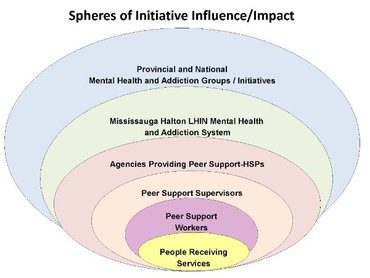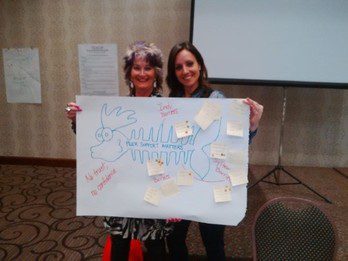
A spotlight feature on TEACH, one of the Excellence through Quality Improvement Project‘s 31 supported initiatives.

February 21, 2017
“Peer support has been very helpful in my recovery. It was not available during my last admission, and it has really changed my experience from negative to positive.” – Person who received Peer Support Services
When a client says this about a mental health service, we’re moving in the right direction. In many ways, this is the outcome that all Quality Improvement (QI) initiatives are striving toward.
Peer support may not be the first thing that comes to mind when you think about what we can do to improve the experience and outcomes for those accessing mental health and addiction services. It may even come as a surprise that in 2014/2015, the Mississauga Halton LHIN’s System Integration Group for Mental Health and Addictions (SIGMHA) identified peer supports as the highest priority for addressing mental health and addiction service needs in their region. MH LHIN’s Enhancing and Sustaining Peer Support initiative (the initiative) has been in place since 2015, so today it’s hard to ignore the positive change it has made for those seeking treatment in that region.
 TEACH is one of E-QIP’s 31 supported projects across Ontario. The initiative is a highly collaborative project, but there are four specific people leading the efforts: Betty-Lou Kristy and Christina Jabalee are the System Leads, Debbie Jones is the Director of TEACH, and Jody Orr is the embedded evaluator.
TEACH is one of E-QIP’s 31 supported projects across Ontario. The initiative is a highly collaborative project, but there are four specific people leading the efforts: Betty-Lou Kristy and Christina Jabalee are the System Leads, Debbie Jones is the Director of TEACH, and Jody Orr is the embedded evaluator.
The initiative is making a difference in the health outcomes for those living with mental health and addictions. It provides hope, empowerment and self-determination to individuals, supports recovery-oriented practice within health care organizations through consultation and conversations with co-workers, peer workers, peer supervisors and leaders within the partner health care organizations. Altogether, this helps create workplaces focused on personal self-care and wellness.
Widespread throughout the MH LHIN area, the initiative has 40 paid peer positions embedded across 11 LHIN-funded health care organizations such as hospital psychiatric inpatient units, addictions residential treatment, supportive housing programs, central access, employment support programs, community mental health and addiction providers, and self-help education and support groups.
The team recognizes that peer support is not always well understood within the formal walls of the health care system. In order to increase the understanding of the value of peer support, the team is using quality improvement processes to translate their learnings. The initiative is focused on the root causes and being guided by people receiving services through meaningful engagement and direct feedback. Perception of quality care, based on a values approach, is not a commonly recognized or researched approach for supporting people with mental health and addiction. That’s why the team decided on a Developmental Evaluation (DE) process, allowing a process for recording and building measurements and evaluation in a project where innovative evolves and emerges as the project progresses. They want to illustrate the impact of this approach, and hope that it will inspire others to follow suit.

The TEACH team immediately recognized the opportunity of getting additional QI support from E-QIP’s province-wide initiative. Now that they’ve been selected, and Laura Daly-Trottier who is the Quality Coordinator at the CMHA Nipissing Regional Branch, has been assigned their QI coach, they have made the most of what E-QIP has to offer. Already, they have started sharing that knowledge with others in the sector.
“It was a perfect opportunity for us to add more QI bench-strength and knowledge to our project,” said Betty-Lou. “Equally important, it was an opportunity to collaborate with like-minded organizations across Ontario, and even showcase our work so that many more people living with mental health and/or addiction issues in our province can benefit from peer support as part of their formalized health care interaction. Being involved with E-QIP has given the work even more focus.”
They’ve learned ways to use QI mechanisms such as Root Cause Analysis, Fish Bone Diagram, The 5 Why’s and Pareto Charting to identify their Problem Statement, Root Cause, Change Ideas, Triangulate Scope / Boundaries, create an Aim Statement, identify Key Milestones/ Timelines and develop Barriers and Mitigation Strategies. All these tools led them to develop their E-QIP Project Charter. Through this work, ultimately, everyone agreed that the root cause of the re-occurring issue of clarity and definition of Peer Support Roles is that Peer Support is based on values including: hope and recovery; self-determination; empathetic and equal relationships; dignity, respect and social inclusion; integrity, authenticity and trust; health and wellness, and; lifelong learning and personal growth. We need to determine the degree to which these values are present as perceived by people receiving peer services. The results of this will drive additional QI processes regarding trainings, support, organizational culture and philosophy shifts to foster values based peer support.
For Laura, working as TEACH’s QI coach has been such a rewarding experience. “This team – we’ve called them Team Amazing – has captured the essence of what E-QIP has to offer. This group has embraced the vision of E-QIP and its goal to increase the understanding of quality in mental health and addictions care and sector-wide QI learning and mentorship.”
Let’s look at an example. In December, they hosted a full day Peer Knowledge Exchange. They facilitated a Solution Session Workshop on “Building Capacity of People with Lived and/or Family Experience for System Change.” Drawing on the knowledge and diagnostic tools learned through their involvement with E-QIP, they took the workshop attendees through the session using the Fishbone Diagram and the 5 Why’s process to source the root causes relevant to each group’s focus.
As Laura explains, “They have applied the tools in a practical way, sharing their new found knowledge with others helping to increase the capacity for quality improvement in the sector.”
What does the future hold? In the coming months, they will be applying the remaining pieces of the Experience Based Co-Design tool kit to their project. Most importantly, their work will reach more people with mental health and addiction problems. Hopefully their work will inspire more comments from clients like this one, “Peer support was a life saver for me. It was the first time that I felt someone understood me from over a dozen hospital admissions where there had been no peer workers.”
[/et_pb_text][/et_pb_column_inner][/et_pb_row_inner][/et_pb_column][/et_pb_column][/et_pb_section]